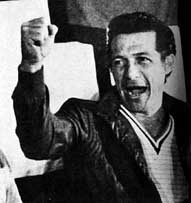Roberto D'Aubuisson
| Roberto D'Aubuisson | |
|---|---|

Major Roberto D'Aubuisson
|
|
| Born |
Roberto D'Aubuisson Arrieta August 23, 1943 Santa Tecla, El Salvador |
| Died | February 20, 1992 (aged 48) |
| Nationality | Salvadoran |
| Other names |
Chele Blowtorch Bob |
| Occupation | Soldier, politician |
| Known for | death-squad leader, ordered the assassination of Archbishop Óscar Romero |
| Spouse(s) | Luz Maria |
| Children | 4 |
Roberto D'Aubuisson Arrieta (August 23, 1943 – February 20, 1992) was a Salvadoran soldier, extreme right-wing politician and death-squad leader. In 1981, he co-founded and became the first leader of the Nationalist Republican Alliance (ARENA) and served as President of El Salvador's Constituent Assembly from 1982 to 1983. He was a candidate for President in 1984, losing in the second round to José Napoleón Duarte. After ARENA's loss in the 1985 legislative elections, he stepped down in favor of Alfredo Cristiani and was awarded the honorary post of party president for life. He was named by the UN-created Truth Commission for El Salvador as having ordered the assassination of Archbishop Óscar Romero in 1980.
D'Aubuisson was born in Santa Tecla, La Libertad Department, El Salvador, graduating from the national military academy in 1963. He was part of La Tandona, the class of 1966 at the Escuela Militar. In 1972, he was trained in communications at the School of the Americas, a United States Department of Defense Institute that provides military training to government personnel in US-allied Latin American nations. After completing his studies at the Institute, he subsequently became a member of the Salvadoran military intelligence.
On May 7, 1980, six weeks after Romero's assassination, D'Aubuisson and a group of civilians and soldiers were arrested on a farm. The raiders found weapons and documents identifying D'Aubuisson and the civilians as death squad organizers and financiers, and of planning a coup d'état to depose the Revolutionary Government Junta (JRG, 1979–1982) governing El Salvador. Their arrests provoked terrorist threats and institutional pressures, leading to D'Aubuisson's return from Guatemalan exile. Thereafter, he regularly denounced the JRG and specific enemies on television, and many have accused him of culpability in the subsequent deaths of some of those he publicly denounced.
...
Wikipedia
